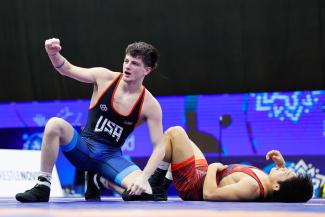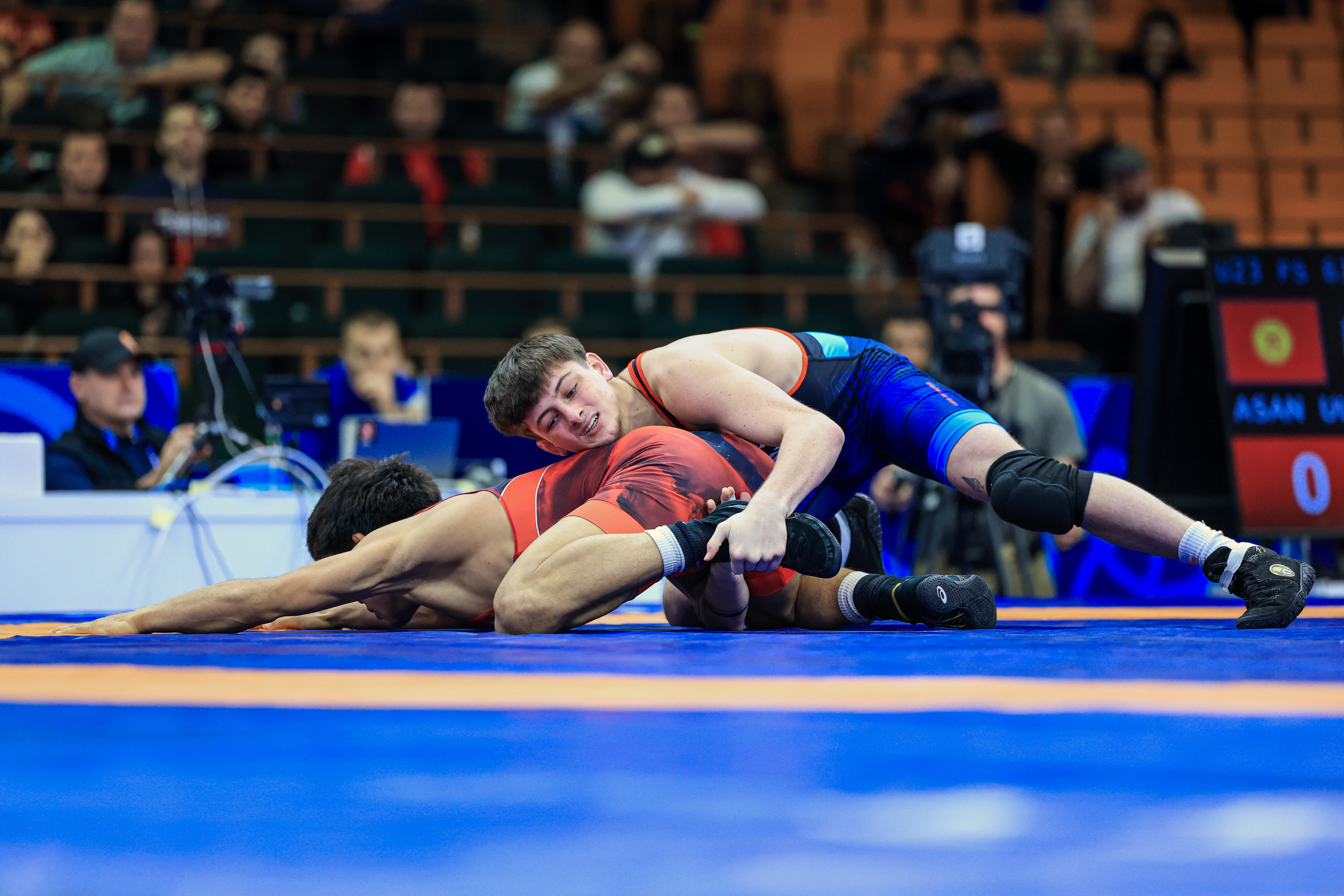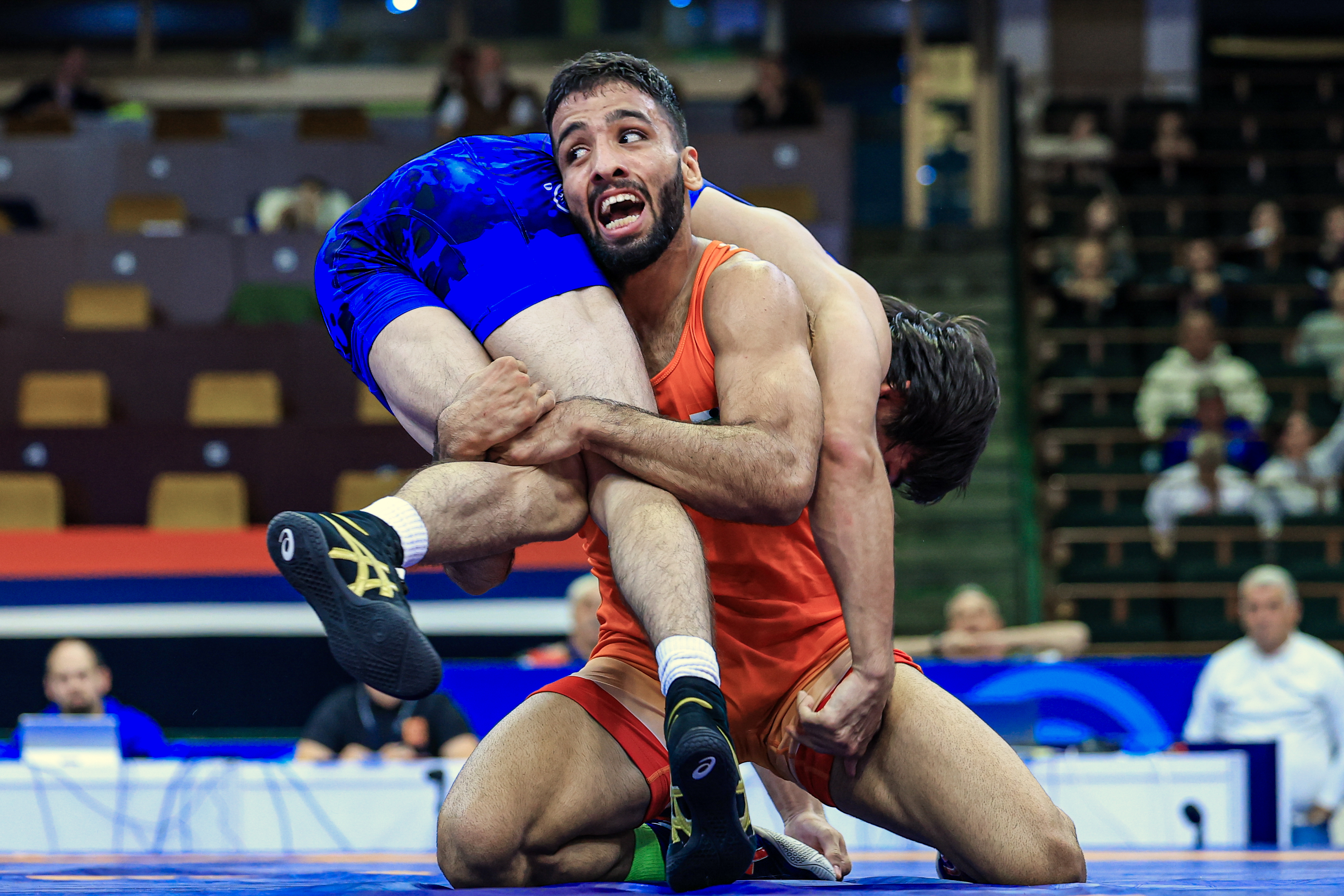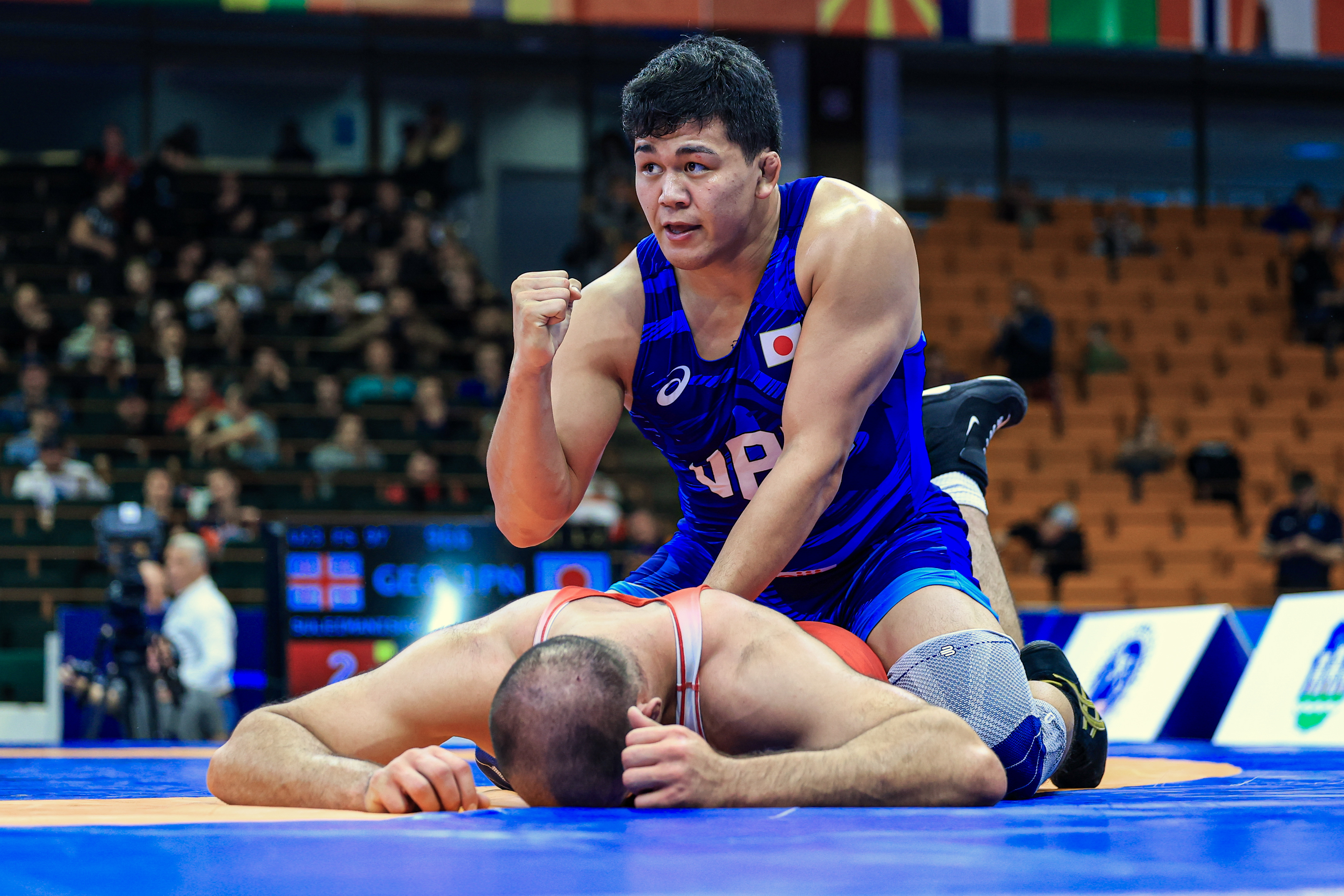All-Japan Championships: World Champ Fujinami Aims for 2nd National Title as Olympic Medalists Sit Out
Tuesday, December 14, 2021 - 10:00 By Ken Marantz

TOKYO, Japan (December 13) -- It was a year ago that highly touted teenager Akari FUJINAMI (JPN) made her senior debut at the Emperor's Cup All-Japan Championships. She lived up to the hype by winning that tournament, which became the launching pad for her to rocket to stardom.
Fujinami, who turned 18 last month, is back to defend her women's 53kg title, this time as the reigning senior world champion.
"After the World Championships, I had to quarantine for two weeks," Fujinami said in a telephone interview. "During those two weeks, I took another look at my wrestling. I am prepared to perform at a higher level at the Emperor's Cup."
Unfortunately, a highly anticipated match-up between Fujinami and Olympic champion Mayu MUKAIDA has been put off indefinitely, as none of Japan's five gold medalists from the Tokyo Games are entered in the tournament to be held Dec. 16-19 at Tokyo's Komazawa Gym.
Still, all but one of Japan's 12 medalists from October's World Championships in Oslo are entered, and two women's weight classes have potential clashes between a world champion and a world medalist as wrestlers begin the shift in divisions to start the new Olympic cycle.
Among the men, record-setting world Greco-Roman champion Ken MATSUI faces a possible showdown with another history-maker at 55kg, while veteran Sohsuke TAKATANI will attempt to become the third wrestler in Japan history to win an 11th consecutive national title when he defends the freestyle 92kg crown.
The Emperor's Cup is the first of two domestic qualifiers, along with the Meiji Cup All-Japan Invitational Championships in the spring, for next year's World Championships in Belgrade. It is also a qualifier for the 2022 Asian Games in China, which may actually complicate matters as that event starts just three days after the World Championships.
Although Tokyo has gone more than a month with under 30 new daily cases of coronavirus, strict protocols are in place, including the banning of family, friends and general spectators.
Entries were limited to a maximum of 12 per weight class, each of which will begin and finish on the same day.
While Fujinami, currently a senior at Inabe Gakuin High School in Mie Prefecture, won't have to contend yet with Mukaida, there is no lack of top-notch competition for her. At last year's Emperor's Cup and this year's Meiji Cup, Fujinami defeated both two-time former world champion Haruna OKUNO and former world silver medalist Nanami IRIE, and both are entered and looking for revenge.
"I'm sure both of them, or everyone for that matter, have been studying me," Fujinami said. "Instead of regarding myself as the champion, I will approach this tournament the same as always, without forgetting the feeling of being the challenger."
But anyone looking to dethrone Fujinami will have to be at the very top of their game. With her four victories in Oslo -- all by technical fall, and without surrendering a point -- she is currently on an 83-match win streak that dates back to her junior high school days in 2017.
Asked what progress she feels she has made over the past year, Fujinami replied, "I feel like I've raised my level physically."
As for being deprived of the desired showdown with Mukaida, Fujinami took the news in stride. "It was a situation where I didn't know, is she going to enter or she not going to enter," she said. "In the end, she won't be there.
"I don't know the next time she will appear, but I know she is someone I will have to ultimately beat. Right now, the Emperor's Cup is right in front of me and winning is the only thing I am thinking of. I want to win this and go to the World Championships."
Is she disappointed? "I wouldn't say disappointed, I just really want to face her," she replied with confidence and maturity belying her years.
To the not-so-serious suggestion that Mukaida might be avoiding her, Fujinami replied, "I understand that after the Olympics, she is still on kind of a high. I think she will enter next year."
Fujinami said she is undecided, if she qualifies, on whether she would attempt to complete a world and Asian Games double in September next year.
"If I can enter both, I'd like to do that. When the time comes, we'll see how it works out. At any rate, my objective now is to win the Emperor's Cup."
The Japan federation has not released information on why all of Japan's Olympic medalists, who also include gold medalists Yui SUSAKI, Risako KAWAI, Yukako KAWAI and Takuto OTOGURO, are skipping the tournament. In fact, of the 12 wrestlers who took part in the Tokyo Olympics, only Takatani will be taking the mat at Komazawa Gym.
Possibly they have not had time to properly prepare. Like all of Japan's Olympic champions, the wrestlers were in high demand on Japanese TV variety shows, particularly the Kawai sisters (on one show, they were taken shopping to a major electrical appliance store, where the host, a famous Japanese comedian, footed the bill.) Also, Risako Kawai and Mukaida both got married soon after the Games, and have been busy setting up their new households.

But even without them, a Japanese national championship is never lacking for star power. Along with Fujinami and Matsui, newly minted world champions Remina YOSHIMOTO, Tsugumi SAKURAI and Masako FURUICHI all won their first national titles last year and will be in action this week.
Shigakkan University's Yoshimoto will be defending her title at women's 50kg, and will be the favorite in the absence of Susaki, while Sakurai and Furuichi have changed weight classes and might have to contend with a fellow world medalist.
Sakurai, the world champ at 55kg and the first-ever national champion for recently founded Ikuei University, has moved up to 57kg, which puts her on a possible collision course with two-time defending champion Sae NANJO, the bronze medalist at that weight in Oslo.
Furuichi, who completed a "grand slam" of world titles when she added the senior 72kg crown in Oslo to her previous world titles at the cadet, junior and U23 levels, has dropped down to the Olympic weight of 68kg. That could mean a clash with Rin MIYAJI, the world silver medalist who pulled off one of the biggest upsets in Oslo when she knocked off Olympic champion Tamyra MENSAH STOCK (USA) with a 21-second fall in the semifinals.
At 62kg, world bronze medalist Nonoka OZAKI will be looking to make history as she aims for a second straight title. The 18-year-old won her first title last year as a high schooler and, after graduating last March, she opted to take the academic route and passed the difficult entrance exams for prestigious Keio University. A victory on Saturday would make her the first current student or alumni of Keio to become a national champion in 62 years.
World silver medalist Miwa MORIKAWA will look to win a third straight title as the defending champion at 65kg. In her path is 2018 world bronze medalist Ayana GEMPEI, who returned from a long layoff due to knee surgery at this year's Meiji Cup and finished third at 68kg.
In freestyle, the spotlight will be on Takatani. The 2014 world silver medalist at 74kg, he won his 10th straight national title last year at 92kg in his fourth different weight class. He later dropped down to 86kg and qualified for his third Olympics in Tokyo, but suffered a heartbreaking 2-2 loss in the first round.
If successful, he will become the fifth wrestler in Japan history to capture 11 national crowns and the third to do it in consecutive years. Two-time Olympic bronze medalist Kyoko HAMAGUCHI holds the record with 16 titles won between 1996 and 2013. His main competition is likely to come from the 2020 Asian silver medalist Takuma OTSU.
Japan's lone freestyle medalist in Oslo, Toshihiro HASEGAWA, who won a silver at 61kg, has dropped down to 57kg in his quest for a first national title. Also entered is Toshiya ABE, who finished seventh in that weight class in Oslo.
Moving the opposite direction is Rio 2016 Olympic silver medalist Rei HIGUCHI. After an unsuccessful bid to make Japan's Olympic team at 57kg -- he lost in a playoff to Yuki TAKAHASHI -- and struggling mightily to make that weight, he has moved back up to 61kg as he seeks a fourth career national title.
Also entered at 61kg is Kazuya KOYANAGI, the 2018 Asian silver medalist who finished seventh that year at the World Championships, and bronze medalists from the past two Asian Championships, Ryuto SAKAKI and Shoya SHIMAE.
In Greco-Roman, Matsui faces a possibly intriguing match-up at 55kg. When he won the gold in Oslo, Matsui was 20 years 8 months, making him Japan's youngest-ever world Greco champion. Five months earlier, Yu SHIOTANI made history by becoming, at age 19 years 5 months, the nation's youngest-ever Asian champion in that style. Both are aiming for a first national title.
Another weight to watch is 72kg, where four-time champion Shogo TAKAHASHI could end up facing his high school coach in defense of his title. Takahashi competed almost exclusively at 67kg in his career, but the 2019 Asian bronze medalist moved up to 72kg last year as beefed-up preparation for the Olympic qualifying tournament.
The 27-year-old Takahashi missed out on Tokyo, and this year decided to enter at 72kg again. That could set up a match with Tomohiro INOUE, his coach at Ikuei High School in Hyogo Prefecture. Inoue, 34, won the last of his four national titles in 2018. He was a 2016 Olympian and was a member of his third world team in Oslo.
The two met in the 66kg final in 2015, with Inoue winning by technical fall. After that, they went their separate ways and into different weight classes, and have not clashed since. On the final day Sunday, they may have to contend with Asian bronze medalist Taishi HORIE and newly crowned collegiate champion Eito NISHIDA, a freshman at Senshu University.
Schedule
Day 1 (December 16)
FS - 70kg, 97kg, 125kg; GR - 77kg, 82kg, 87kg; WW - 59kg, 76kg
Day 2 (December 17)
FS - 65kg, 79kg; GR - 60kg, 67kg, 130kg,; WW - 55kg, 65kg, 72kg
Day 3 (December 18)
FS - 61kg, 74kg, 86kg; GR - 63kg, 97kg; WW - 57kg, 62kg, 68kg
Day 4 (December 19)
FS - 57kg, 92kg; GR - 55kg, 72kg; WW - 50kg, 53kg
The competition starts each day at 10 a.m. Each weight class starts and finishes on the same day. Entries are limited to 12 per weight class, with no repechage and only one bronze-medal match.


 Jaxen FORREST (USA) scores a takedown against Umurbek ASAN UULU (KGZ). (Photo: United World Wrestling / Amirreza Aliasgari)
Jaxen FORREST (USA) scores a takedown against Umurbek ASAN UULU (KGZ). (Photo: United World Wrestling / Amirreza Aliasgari) SUJEET (IND) scores the match-winning takedown against Umidjon JALOLOV (UZB). (Photo: United World Wrestling / Amirreza Aliasgari)
SUJEET (IND) scores the match-winning takedown against Umidjon JALOLOV (UZB). (Photo: United World Wrestling / Amirreza Aliasgari) Arash YOSHIDA (JPN) celebrates after beating Merab SULEIMANISHVILI (GEO) in the 97kg final. (Photo: United World Wrestling / Amirreza Aliasgari)
Arash YOSHIDA (JPN) celebrates after beating Merab SULEIMANISHVILI (GEO) in the 97kg final. (Photo: United World Wrestling / Amirreza Aliasgari)
Share your thoughts.
Comments